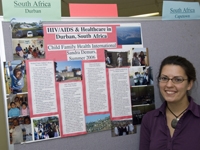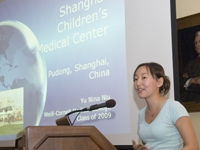In between a Weill Cornell student's first and second year, a curious thing happens; their summers disappear and coursework becomes a year-round experience. But before that happens, many students use their last few fleeting summer months to take an international elective and travel abroad to learn about health-care delivery in other, often less affluent, countries.

Interest in sub-Saharan Africa brought many students to the region, including second-year student Sandra Demars, who traveled to Durban, South Africa, during the 2006 summer.
"It's the only free summer that the students have," said Dr. Madelon Finkel, director of the Office of Global Health Education and professor of clinical public health at Weill Cornell. "At that point, the students are well-versed in epidemiology and public health, which allows them to focus on social aspects of medicine."
In order to receive credit and financial assistance, students must craft a project proposal and have both a Weill Cornell and host country sponsor it before going abroad. After returning, students must report the outcome of their projects. Each student is required to prepare a poster for presentation at a reception held in early October. In addition to sharing their experience with their classmates, the presentations also serve to whet the appetite for an international experience among the incoming first-year class.
Second-year student Ian Huntington's five-week experience this past summer in Quetzaltenango, Guatemala, represents in some sense both what the College's program has achieved and what it seeks to do in the future.
"I kept my proposal pretty open. I wanted to remain flexible and keep looking around for questions that grabbed me," said Huntington. While observing in a general clinic, he realized that diabetes typified something of a social change in Guatemala; as the country undergoes globalization, diseases associated with obesity are on their way to becoming as important as those associated with malnutrition.

Second-year student Yu Nina Niu gives a presentation of her visit to Shanghai's Children Medical Center, during the International Student Reception on Oct. 3.
Huntington began looking closely at diabetic health-care delivery, from observing patient-doctor interactions in a government-sponsored specialty diabetes clinic to researching records at the regional public health office. Before the end of the year, a first-person account of his experience will be published in Global Pulse, the international health journal of the American Medical Student Association.

The general clinic where second-year student Ian Huntington spent five weeks this past summer helping patients in Quetzaltenango, Guatemala.
According to Dr. Finkel, last year 20 percent of first-year students took an international elective, while 30 to 40 percent of fourth-year students elect to spend between 6 to 8 weeks abroad generally focusing on providing medical care to underserved populations and taking on more substantial research projects in a variety of fields. One of the newest opportunities for international student electives is at the Bugando Medical Center in Tanzania, with whom Weill Cornell has shared several years of cooperative exchanges and support. Student interest in sub-Saharan Africa has dramatically increased, with three to four students traveling there each year. Other opportunities include programs in Panama, India and Australia, which gives the student both an urban and outback experience.
"We are trying to expand from a traditional focus on infectious disease to encompass other opportunities in a wide variety of locations, including public health aspects of global health," said Dr. Finkel. "Our program at Weill Cornell seeks to provide an enriching experience in both developing and developed countries."
Photos by Amelia Panico.

